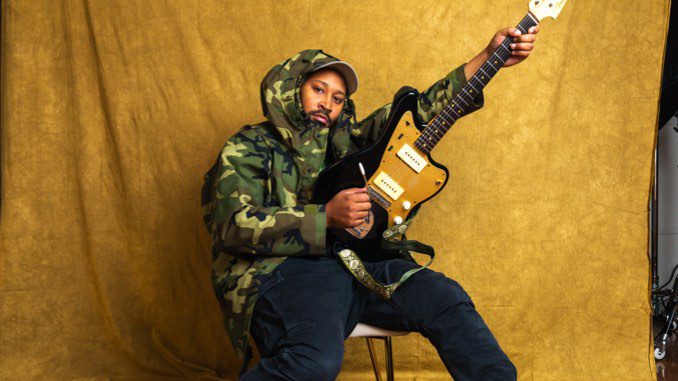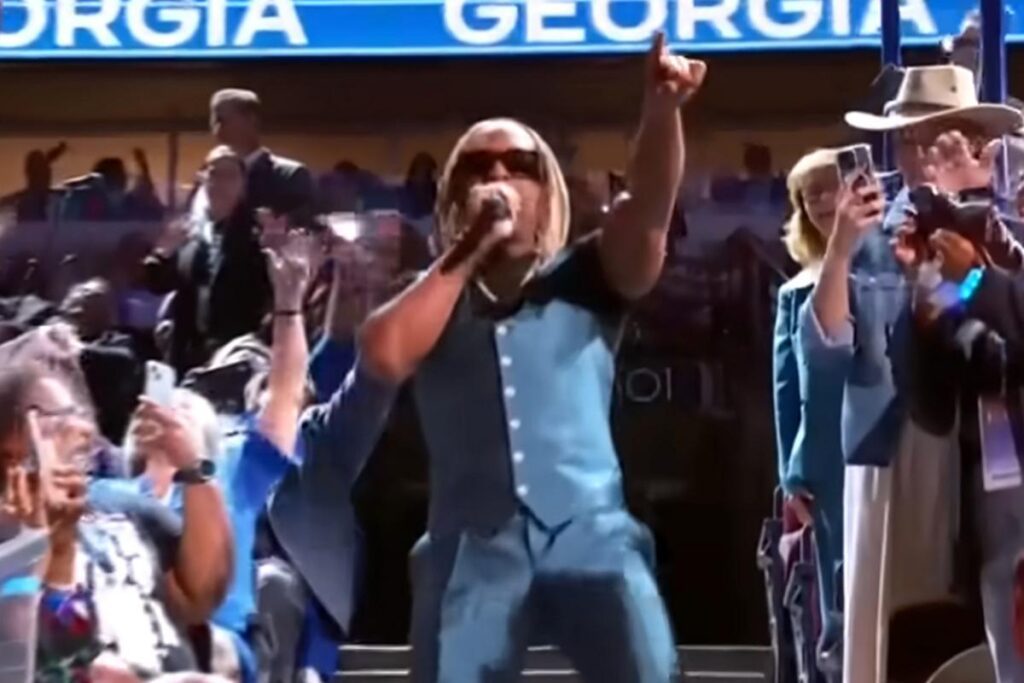A week before I rang up Bartees Strange to talk about his new record, Farm to Table, he returned home to Oklahoma to play a 10-song set. “I’ve been dreaming about that show since I was 15 years old,” Strange excitedly tells me over the phone. “The Tower Theatre is a really amazing and legendary place. I used to watch kung-fu movies there when I was in high school.” Strange, the choral polymath son of an Air Force geodetic engineer and a traveling church and opera singer, grew up a half-hour outside of Oklahoma City, in Mustang. His family settled in the area after migrating around Europe during Strange’s first few years on Earth. Though the Sooner State quickly became home base for Strange, his mom and his siblings while his dad served overseas, he had his sights set east, and he’d spend stints in D.C. and NYC before holing up in his current spot, Falls Church, Virginia. “It was amazing to leave Oklahoma right in the middle of college, come to the East Coast and figure myself out, and then come back like this,” he recalls, “because everyone in Oklahoma that I grew up with, they know me as a musician. It was cool to come back and see everyone again and reconnect with music being the foundation.”
I mess with Bartees Strange for a number of reasons, but, mainly, it’s because he’s one of the brightest lights we’ve got in this godforsaken landscape of hurt. An essential post-genre troubadour, Strange is a game-changer, blurring the line between producer and performer while fostering a community within every audience he plays for. When I saw him open for Lucy Dacus at the Newport in Columbus last October, he blew the room away just after dusk fell onto High Street outside. Strange’s stage presence is gravitational—he makes everyone in the audience, even the balcony dwellers, feel front row. “My school of philosophy on shows is: It’s a gift,” he says. “I have a gift and I get to share it with people, and I get to watch them react to this thing I love doing. I never thought I’d get to do any of this, so every time I play, I’m just like, ‘This is the coolest thing in the world. I wrote these songs and I get to play them with my heroes.’”
Speaking of heroes, when I eagerly tell Strange there are rhythmic moments on his new album that sound like The National’s Trouble Will Find Me, he responds by mimicking Bryan Devendorf’s drums from “Apartment Story.” “Dog, ‘Black Gold’ is literally Big Red Machine drums,” he tells me. “I pull from the [Aaron] Dessner textbook all the time. ‘Heavy Heart,’ that’s Boxer drums. It’s ‘Geese of Beverly Road.’ I live off that shit.” Strange affectionately likens vocalist Matt Berninger’s onstage translations of Dessner’s arrangements as “like watching a politician speak”—a formula he channels in his own performances. His first major release, 2020’s Say Goodbye to Pretty Boy EP, was comprised of National covers; the Cincinnati, Ohio, quintet is his favorite band. Immediately, there’s a kinship between us there, even though we’ve never met in person. Few artists will so passionately talk shop about the same old shit over the phone; even fewer speak in a cadence littered with such excitement about influences on a weekday morning.
Strange is getting ready for his new album’s June 17 release, which he’ll be celebrating at the Getty Museum in Los Angeles the day after, but today he’s about to go to the dentist. “I’ve been trying to get an appointment, like, all year,” he says. “Yeah, so, it’s a good day.” Since shows kicked back up in a slightly lighter world of COVID, Strange has traveled the country relentlessly, pushing the good word and buoyant, dizzying tunes from his breakout 2020 debut, Live Forever. Songs like “Mustang,” “Boomer” and “Flagey God” quickly became auspicious and proper renderings of modern alt-rock, exposing how the landscape Strange works from is not one-dimensional; it’s alive and always accumulating a richer complexity. He’s transforming how songs can breathe by making them busy, infusing them with bustling electronica, lo-fi trap beats and seering, From Under the Cork Tree-era guitar riffs.
Before taking the indie world by storm with Live Forever, Strange worked in Barack Obama’s administration as the Federal Communications Commission’s press secretary. “When I left Oklahoma, the first person I voted for was [Obama],” he tells me. “I was pretty hellbent on meeting him and working for him.” An old boss vouched to the FCC on his behalf and, after a yearlong interview process, he was hired. “I remember going to the White House and I would see [Obama] just walk by or [I’d be] in a meeting and he’s there, calling in or whatever. I was like, ‘Damn, this guy is a real person.’ I was so impressed with him and how he ran his team.”
But even as he shared a space with the president, Strange had no appetite for the gig long-term. After eight months in Washington, he quit and pivoted his full focus towards the labor movement in New York. He’d end up moonlighting in hardcore bands while working for the communications firm BerlinRosen as a policy consultant for Communications Workers of America and the Service Employees International Union. “I was one of the communicators on the Fight for $15 strikes against McDonald’s,” Strange notes, “helping marches go as planned, advising media, prepping speakers and press.” Eventually, he zeroed in on the climate movement, doing environmental justice work—which is where he was when he wrote Live Forever.
It wasn’t until Live Forever came out that Strange finally got to quit his day job. And now that he’s got a record deal with 4AD, the mundanity of office cubicle work is fully in the rearview—though Strange recognizes that it’s something he can return to if the buzz ever quiets down completely. “I do think one thing about working a nine-to-five is, mentally, it takes a lot of pressure off music, because I know I can do other things,” he says. “I don’t want to, but I know if things don’t work out, I can figure out another way to survive.”
Strange started working on Farm to Table the day Live Forever came out in October 2020. “I was scared,” he recalls. “I didn’t want to know what anyone thought about Live Forever until I got some new ideas down.” He and his friends set up shop in a secluded cabin in the Maine woods and started writing what would become the first four singles off Farm to Table: “Heavy Heart,” “Cosigns,” “Hold the Line” and “Wretched.” A lot was riding on Live Forever, and Strange understood that the reception around it would drastically impact the potential of Farm to Table before it was even recorded. “I was like, ‘Okay, if people hate it, it’s gonna mess me up. If people love it, it’s gonna change me, too,’” he adds. “I really wanted to protect the headspace I was in, because I really loved what I made.”
For Strange, it’s always been make it to the stars or bust. There are no rules in his studio—any idea can make it onto the record. He calls production a “fun and curious journey” where he can “try things and have time to look at [a song], move it around and try different rooms.” And, as is their formula, he and his friends threw everything at Farm to Table, leaving no rabbit hole unexplored. “With Live Forever, it was kind of like, ‘Okay, here’s my thesis. I think all of these things work,’” he says of the clustered elements that make each track irreplicable. “I was working from the same headspace [as Live Forever on Farm to Table], but I had also gotten better at making records, so I was ready to one-up myself in terms of clarity and having a message hit harder. I wanted to make something that was an improvement. I wanted to prove to myself that it wasn’t a fluke, that I can do it twice.”
Though there’s been a lot of talk around Strange and his genre-busting catalog, the way he channels all of his influences into a sonic signature can’t be defined so easily. What he’s doing isn’t new, and he emphasizes that truth. But, as he tells me, he’s actively exposing audiences to those sounds in hopes of creating a deeper connection—displaying how everyone is more than just one thing, composed of many small parts. Strange’s music is, at its core, a celebration of Blackness and an ongoing reclamation of music spaces his community helped create. Indie rock has long been inequitable, despite pop, rap, jazz and country sounding the way they do because of Black people. Farm to Table brings the focus back to that. “Hold the Line” is written about George Floyd’s daughter; “Hennessy” is an ode to Black friendship and love; “Black Gold” reckons with memory and details how thankful Strange is now for the house he grew up in.
Strange, a musical scholar whose interests are constantly widening, is as unconventional a songsmith as he is an unrelenting worker, and he’s cultivating a burgeoning bag of tricks. “When I think about making music, I think of tools,” Strange explains. “I think of myself as someone who builds things, like a carpenter or a construction worker. And all of these different genres are tools for schools of thought on building. I’m like, ‘Why can’t I just use any tool I want to build whatever I want? Why would I limit myself to just rock tools or just pop tools when all of these tools are referencing each other?’ If I can find those connections, I might build something completely new.”
Farm to Table, much like Live Forever, finds Strange back in splendid control of his tools. Sometimes he sounds like JPEGMAFIA, other times he’s channeling mid-aughts Bloc Party. On the electronic, synth-driven “Wretched,” premiering today (June 13), he conjures early-2010s millennial kinship with #1-hit rhythms; among the lush tendrils of “Mulholland Dr” are dreamy guitars reminiscent of The War on Drugs. “Cosigns” is his love letter to the artists who’ve given him a shot since Live Forever. It’s there, in a flow placed atop a SoundCloud-like beat, where he name-drops artists he’s opened for (Phoebe Bridgers, Dacus, Courtney Barnett) while flexing his Ws. The track, like so many of Strange’s toughest compositions, is not bound to one continuous sound, as it crescendos into an alt-rock arrangement while he reads a poem he wrote in his 20s—another bond between then and now.
To support Farm to Table this summer, Strange is upping his cred and touring with The National and Metric. He reaps what he sows, and he knows that, every night onstage, he’s throwing a lot of different musical elements at audiences who, two years ago, might not have fucked with his stuff. But now, two records deep and with a passionate, swelling fanbase in tow, the audiences are throwing his lyrics right back at him.
“I’m learning that my thesis was right, that people do like a lot of stuff. The people who love Car Seat Headrest also love Nelly. People who fuck with Phoebe Bridgers, a lot of them really fuck with Freddie Gibbs. A lot of them really fuck with Megan Thee Stallion. A lot of them really love Dua Lipa. We’re all out here listening to a lot of shit. It’s cool to see it manifest itself into a group of people who know nothing about my music. When we play ‘Cosigns,’ everybody goes crazy. When we go into ‘Hold the Line,’ people start crying. It’s like we’ve shed this layer of, ‘I’m a punk rock kid and I like punk rock,’ or ‘I’m a hypebeast and I only wear Supreme and listen to Madlib.’ In those moments, we tear that apart. Everyone is just people in a room. And from there, the spirit can move. We can connect and we can explore together. That’s the goal, and it’s the most beautiful part in music.”
Strange hasn’t broken the system—he’s just refusing to let his creativity exist in a vacuum. As he keeps soaring and touching every branch extended to him, no sound is off limits. The surge he’s harnessed makes the stratosphere look like light work. But the heights Strange climbed on Live Forever still, sometimes, manifest into a fear that he’s carried with him for years: navigating how people treat you once you’ve found success. During our call, he speaks gently of growing up in the South with certain rules enforced to keep him safe. His parents cautioned him on what to wear, who to date, what music to listen to and when he needed to come home. “Everything becomes a little bit more serious when you’re Black in the South. That’s your framework for learning everything,” Strange says. “When you get older and you start creating things and building something new, everyone that was afraid of you wants to be close to you. All of a sudden, the fear starts to dissipate, but you still are carrying some of it.”
Farm to Table is, to put it plainly, destiny for Strange, a chance to both foster a community through gratitude and hoist up the folks who’ve been behind him from the start. It’s the book written in support of Live Forever’s thesis; a meditation on hard-earned treasures and opportunity; a world spinning on an axis of equity, in which everyone Strange holds close is getting a piece of the pie. When the album greets us at a crossroads on “Heavy Heart,” and Strange is yearning for his partner’s return, he is wealthier and more famous, fully in his bag and likening a year spent on the road to his father’s overseas service. Oversized braggadocio is a hard sell unless we’re rooting for the artist; with Strange, especially on “Cosigns,” it’s earned, because he’s not only flaunting riches he beat the odds to earn, but he’s also always reaching backwards towards the moments that molded him. His music is evocative of humility, not ego, as he reconsiders what place the people from his past have in his present.
Where Live Forever celebrated Strange’s hometown of Mustang, Farm to Table celebrates those he’s bringing with him as things break his way—and gathers up the folks he wants sitting in his corner when he becomes the biggest rock star on the planet. “When we used to organize labor campaigns, we’d start backwards,” he says. “We’d be like, ‘Okay, when we win, who’s at the table?’ I think, now, I’m like, ‘Alright, if I accomplish these things I want to accomplish, how do I still deal with myself and all the things I’m still afraid of?’ All of these things [that] made me who I am, I may not need going forward. I might need new tools on my team to not be so afraid. Fear’s a powerful thing. I think about that a lot.”
On NT17 Studios’ Farm to Table cover art, a collage of Strange’s childhood photos rests atop a Mustang backdrop. Centered is a faceless Jesus Christ at the Last Supper table. Church and religion have been foundational for Strange since he was a kid, though he isn’t the practicing Christian he was 20 years ago. Back then, his mom was a praise team leader, and his dad lovingly called her a “church hopper” because she’d follow singing jobs to two or three services across the state every Sunday. “I was raised by my church,” Strange says. “All the women let me stay at their house for a week or so, so my mom could go and sing somewhere. When my dad was in Kuwait, and someone needed to just watch me for a couple days and give my mom a break, the church folks really stepped up for my family.”
Strange strips down on Farm to Table’s closer, “Hennessy,” as he channels his upbringing with a loose, echoing gospel song that showcases his greatest strength: his voice. “Some days I don’t feel like I’m the man,” he croons, passionately, about the pressures of expectation. Two years ago, he offered a similar worry on “Boomer” when he sang, “Sometimes, it’s kinda hard to tell exactly where I wanna go.”
When Strange was a kid, he sang opera, played football and aspired to be a weatherman. “So many of my days [were spent] driving home from Norman, Oklahoma, from opera camp, going straight to football practice, taking my makeup off in the car and putting my helmet on and running out of the car,” Strange recalls, noting how his family encouraged him throughout whatever endeavor he got stoked on, because they believed he could excel at whatever he chose to become.
Across the back half of Farm to Table, Strange interpolates people having inaudible, but familiar-sounding conversations in the backgrounds of songs. It’s like he’s pouring his heart out at a crowded dinner table, or in a bustling living room. When he boasts, “I’m talkin’ ‘bout forever,” across several octaves, the album fades out in an a cappella sing-along. It’s a fitting proclamation to end on, a living document of an enduring truth: Strange still has more magic to discover as he conquers the world, and he’s bringing us all with him.
Farm to Table is out this Friday, June 17, on 4AD. Stream/buy here.
Matt Mitchell is a writer living in Columbus, Ohio. His writing can be found now, or soon, in Pitchfork, Bandcamp, Paste, LitHub and elsewhere. Find him on Twitter @matt_mitchell48.




